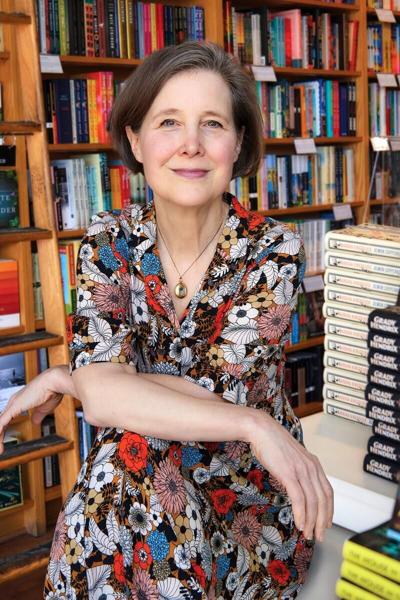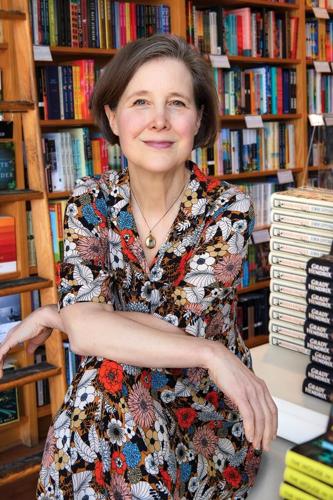Imagine having the prodigious talent to hold the entire plot and characters of a novel inside your mind, all of it making a breeze around your head ‚Äúlike oversized butterflies whose wings were cut from the rose window in Notre-Dame.‚ÄĚ
That is what Ann Patchett says it feels like as she thinks her books into being.
Now consider having three unwritten books vying for your attention. Patchett explained: ‚ÄúI started thinking about writing ‚ÄėTom Lake‚Äô while I was writing ‚ÄėThe Dutch House.‚Äô It had sort of been clanking around in my head for a long time. All through writing ‚ÄėThese Precious Days,‚Äô ≥Ŕī«ī«.‚ÄĚ
The award-winning, internationally bestselling writer and perennial independent bookstore enthusiast suggested on the phone from the cool comfort of her home on this blistering morning that we talk about our dogs: ‚ÄúIt‚Äôs too hot here in Nashville for Sparky to do anything but stroll down the street and back, but he is asleep on the couch, and if either my dog or your dogs wake up there‚Äôll be nothing but forgiveness and compassion.‚ÄĚ
If you follow Parnassus Books on social media you’ll recognize her rescue, Sparky, one of the many beloved shop dogs who appear alongside Patchett and her ebullient, knowledgeable booksellers to promote titles hot off the presses.
‚ÄúTom Lake,‚ÄĚ her ninth novel and her 16th book, is rife with humour, tenderness and emotional truth.
‚ÄúThe whole idea for the book started with somebody who played Emily in ‚ÄėOur Town,‚Äô a person who knew that she would age out of the role,‚ÄĚ Patchett said. That Thornton Wilder play is what Edward Albee called ‚Äúthe greatest American play ever written‚ÄĚ and one that continues to run in summer stock. As the Stage Manager character explains to the audience, what they will see is ‚Äúthe way we were: in our growing up and in our marrying and in our living and in our dying.‚ÄĚ
So it goes in Patchett‚Äôs novel as well where three college-aged daughters ‚ÄĒ Emily, Maisie and Nell ‚ÄĒ return to their family cherry orchard in Michigan during the 2020 pandemic lockdown to help their parents, Lara and Joe, harvest that year‚Äôs bumper crop. To amuse themselves, they ask their mother to tell the story of her 1984 romance at Tom Lake Theatre with Duke, a now famous Hollywood actor, when she was cast in coveted repertory roles as Emily in ‚ÄúOur Town‚ÄĚ and May in Sam Shepard‚Äôs turbulent ‚ÄúFool for Love.‚ÄĚ
‚ÄúI can spend up to two years figuring things out before I begin writing, so by the time I start writing I usually know how the book will end,‚ÄĚ Patchett said about her process. ‚ÄúNow, John Irving, of course, knows the last sentence. I won‚Äôt go that far, but I always say if I‚Äôm going to go on a trip I need to know where I‚Äôm going before I leave the house or I don‚Äôt get anywhere.‚ÄĚ
She added, ‚ÄúI start on the first sentence of the first paragraph. The way I write it is the way you read it. But with this book there were a couple of things I couldn‚Äôt decide that kept me from starting: I couldn‚Äôt figure out why (the character) Sebastian stuck with Duke. Then I finally thought, they‚Äôre brothers, my God, they‚Äôre brothers, that‚Äôs why it is what it is. The other thing I couldn‚Äôt decide for the longest time was if this was going to be told by Lara or if this was going to be told by Sebastian. Then it was finally like toss a coin, it doesn‚Äôt make any difference. One isn‚Äôt right, one isn‚Äôt wrong, one isn‚Äôt better. Sometimes I think I might write the Sebastian book. There would be almost no overlap.‚ÄĚ
She had a very good time writing this novel, but the scene that was perhaps the most fun to write takes place early on when Lara first meets Duke and he tells her the story of Tom Lake. ‚ÄúI was just trying to think of a great seduction,‚ÄĚ Patchett said. ‚ÄúHow can you make a character seem so sexy and charismatic and appealing that you think, ‚ÄėI want to follow this guy everywhere.‚Äô‚ÄĚ And you do.
In addition to seamlessly weaving elements of Chekhov‚Äôs ‚ÄúThe Cherry Orchard‚ÄĚ and Wilder‚Äôs ‚ÄúOur Town‚ÄĚ into this tale, Patchett has included impeccably researched details about fruit farming, theatre life, veterinary medicine and idiosyncratic injuries, all of which are essential to the story. ‚ÄúI‚Äôm indiscriminate at hitting people up for facts,‚ÄĚ she said.
From her novel ‚ÄúState of Wonder‚ÄĚ Patchett learned how to write about tricky medical moments, saying, ‚ÄúYou learn a skill in one book and then you take just a little slice of it forward into another book later on.‚ÄĚ
She asked her doctor husband ‚Äúwhat causes a career alcoholic to collapse but not die and he said that‚Äôs an esophageal varices. So I called my friend Tommy, a gastroenterologist, to explain a Blakemore tube to me in such a way that I could boil it down into two clear sentences. When you‚Äôre reading that scene, you have a visual of how utterly bizarre it is without stopping the narrative.‚ÄĚ
Another friend ruptured her Achilles tendon while playing tennis, Patchett said, ‚Äújust when I was at that point in the story and she told me you think you‚Äôve been shot, and I thought, ‚ÄėThat‚Äôs fantastic.‚Äô‚ÄĚ
She also consulted Erin Whiting, who grew up on a fruit farm and co-founded a professional theatre group in Traverse City. Her input was integral. ‚ÄúEveryone I know that‚Äôs done theatre who‚Äôs read this book has said the theatre stuff is perfect. They can‚Äôt say that the cherry stuff is perfect, which it is, because they don‚Äôt know,‚ÄĚ Patchett said.
With each subsequent book Patchett challenges herself to raise the bar stylistically by trying to do something uncomfortably beyond what she can manage.
In ‚ÄúTom Lake,‚ÄĚ she said, it‚Äôs ‚Äúto have two separate storylines that enmesh. How do you really braid them so that the reader isn‚Äôt reading one and wishing to get back to the other one, which they like better.‚ÄĚ She has Lara‚Äôs daughters interrupt, interject and get things wrong, constantly playing on that very human impulse to tell another person how they must have felt.
Patchett hopes readers will find ‚ÄúTom Lake‚ÄĚ ‚Äúboth entertaining and thought-provoking. Sweet and smart.‚ÄĚ She also hopes its sales will give independent bookstores a boost. ‚ÄúIt‚Äôs all part of a financial ecosystem. Perhaps I think about that more than other writers who don‚Äôt own bookstores.‚ÄĚ
A couple of months ago, Bonnie Garmus, who wrote the juggernaut debut ‚ÄúLessons in Chemistry,‚ÄĚ was at Parnassus Books for an event where Patchett earnestly said to her, ‚ÄúThank you for keeping the lights on, thank you for paying everybody‚Äôs salary and health insurance.‚ÄĚ Patchett insisted, ‚ÄúWhen you have a book like that (that sells in big numbers) ‚ÄĒ and not that I think that my book is going to be like that ‚ÄĒ it really does keep these little businesses afloat.‚ÄĚ
‚ÄúTom Lake‚ÄĚ is the genuine article: sweet, smart, tender and true. Like Ann Patchett herself. You will believe every word.
Janet Somerville is the author of ‚ÄúYours, for Probably Always: Martha Gellhorn‚Äôs Letters of Love & War 1930-1949,‚ÄĚ also available in audio, read by Tony Award-winning Ellen Barkin.




























To join the conversation set a first and last name in your user profile.
Sign in or register for free to join the Conversation